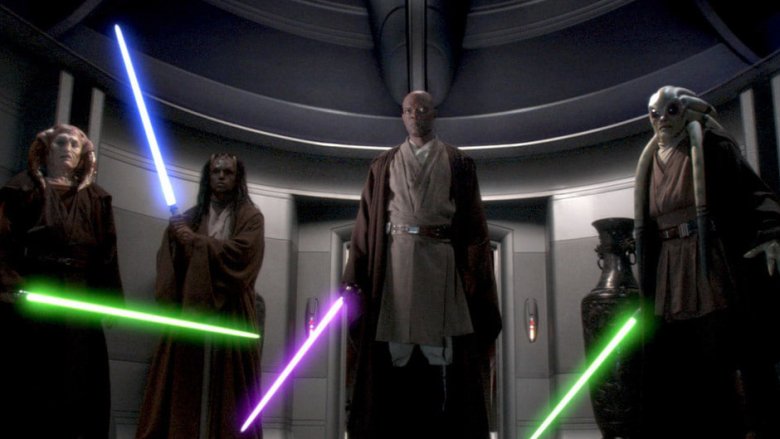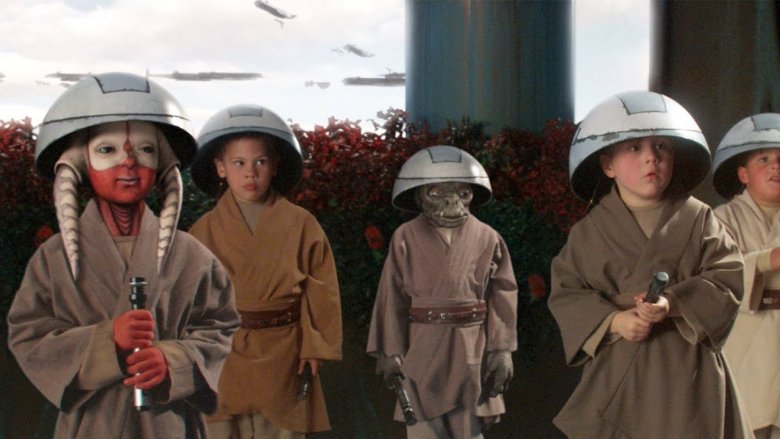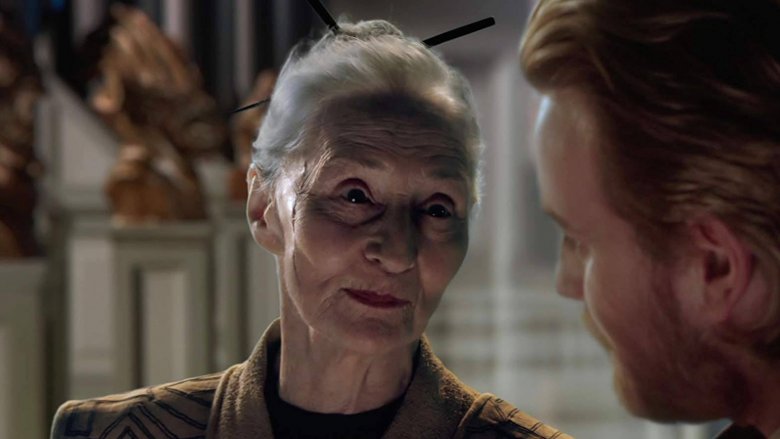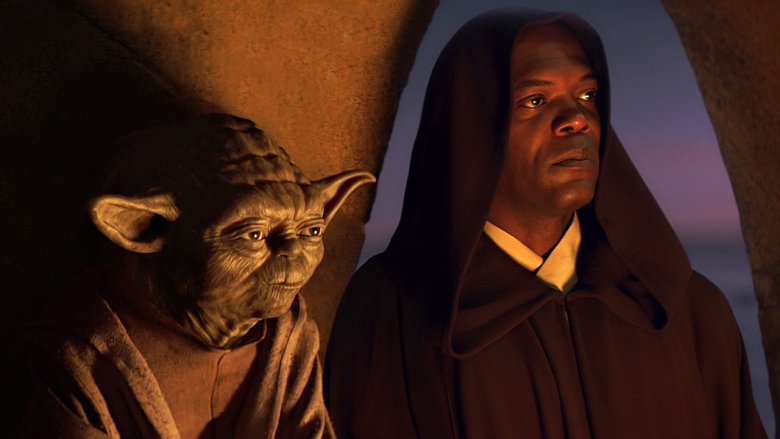All The Jedi Ranks Explained
We may receive a commission on purchases made from links.
The popularity of the Star Wars franchise has had a massive impact on generations of fans, leaving many wishing that they too could wield a lightsaber, command the Force, and travel the galaxy like their favorite Jedi heroes. But what does it take to rise through the ranks of this ancient order of mystic space warriors?
If asked, most Star Wars enthusiasts can easily say that in the Jedi Order, younglings become Padawans. And from there the Padawans become Jedi Knights, and then move on to become Jedi Masters if they are dedicated and skilled enough. But what happens after that? Is it possible to rise even further in the Jedi ranks? What happens to Jedi trainees who don't pass their tests?
For those looking to explore the hierarchy among the guardians of peace and justice in the galaxy, here is a guide to help you navigate all of the ranks within the Jedi Order from youngling to Jedi Master and beyond.
Youngling
Jedi Younglings, also known as initiates, are the lowest rank in the Jedi hierarchy.
According to the book Jedi vs. Sith: The Essential Guide to the Force, younglings are children who were gathered from across the galaxy as infants to be trained as future Jedi. When looking for potential younglings to recruit, The Jedi Order specifically looks for infants that show a sensitivity to the Force, indicating that they may have an aptitude for joining the Jedi ranks.
The Jedi Path: A Manual for Students of the Force explains that at one time, young adults and adolescents were recruited as Jedi Younglings, but the Order found that these older recruits were already exposed to fear and other negative emotions that could push them to the dark side. As a result, Jedi Masters opted to recruit infants who were still innocent and unaware of the darkness looming in the galaxy.
Younglings don't train with a mentor one-on-one. Instead, they are separated into small groups called clans and train together within those clans. Once younglings have learned their basics, they must take a series of tests known as the Initiate Trials in order to progress to the next rank. Though the Initiate Trials have changed over time, their ultimate goal is to test a youngling physically and mentally to determine their knowledge of the Jedi Code and ability to conquer the Dark Side.
Padawan
After a youngling has successfully passed the Initiate Trials, they graduate to the rank of Padawan. Unlike the group training for younglings, Padawans receive one-on-one coaching with their mentor, typically someone with the status of Jedi Knight or Jedi Master. Historically, Jedi would choose who they wanted to mentor. After the Clone Wars, however, Jedi no longer chose their apprentices and were instead assigned them by the Jedi Council.
The jump from structured lessons to real life missions is a significant hurdle for most Padawans to successfully clear. Though they are still learning, Padawans are expected to complete assignments alongside their masters.
Similar to younglings, Padawans must also pass a series of trials to move up in rank. According to The Jedi Path, these tests include the Trial of Skill, the Trial of Courage, the Trial of Flesh, the Trial of Spirit, and the Trial of Insight. The Trials test a Padawan's mental and physical abilities and determine if they are ready to become a fully realized Jedi.
Jedi Service Corps
Sadly, not every Padawan can successfully pass their trials, and some never graduate to the rank of Jedi Knight. These unsuccessful initiates can become members of the Jedi Service Corps. They aren't the only ones who participate, though — Jedi of all ranks volunteer to help the Service Corps in one way or another.
The Jedi Path explains that the Jedi Service Corps is separated into four arms: Agricultural, Medical, Educational, and Exploration. The Agricultural Corps is the largest branch. These folks use the Force to help ensure that the Republic has enough food to go around. The Medical Corps is considered one of the most medically advanced organizations in the Republic, and thus it receives some of the more urgent medical cases on Coruscant. The Educational Corps work with the Jedi archives, translating and updating records. Finally (and arguably the most exciting branch) is the Exploration Corps, which sends its members to the far-flung corners of known — and sometimes yet-to-be-known — space. Their goal is to make new discoveries throughout the galaxy, be they planets, creatures, or artifacts.
Jedi Knight
If a Padawan manages to pass all of their trials, they become a Jedi Knight, regarded as a fully-fledged Jedi within the Order. As a Jedi Knight, an individual is expected to uphold the peace of the galaxy and the ideals of the Jedi Code.
According to The Jedi Path, the most common way to become a Jedi Knight is by passing trials as a Padawan, but an individual can also be granted the title by performing a heroic deed, as exemplified by Obi-Wan Kenobi assuming the rank after defeating Darth Maul.
At this point in the hierarchy, Jedi Knights still have much to learn about the Force, but they no longer carry out their duties under the direct supervision of a Jedi Master. From here, most Jedi Knights carry out their missions alone, testing their self-discipline and upholding the principles of the Jedi Code on their own.
Unlike previous ranks, Jedi Knights are split into various classes based on what skills each Jedi has an aptitude for. For example, there are Counsellors, Sentinels, and Guardians, each with specific subclasses and specializations.
Jedi Consular
When people think of the Jedi, two things usually come to mind: the Force and lightsabers. In many cases, those who specialize in the manipulation of the Force pursue the title of Jedi Consular. Most of these Jedi are focused on using their connection to the Force to resolve conflicts in a peaceful way.
According to The Jedi Path, the most esteemed Jedi Consular Masters serve on the Reconciliation Council, a select group of Jedi who work directly with the Republic Diplomatic Corps to engage in diplomacy and interplanetary relations. The Jedi Consulars who are the most skilled reach the rank of Sage Master.
There are many different ways for Jedi Consulars to use their talents within the Order. First among these are Jedi Seers, whose deep meditation allows them to connect to the Force and receive visions of the past, present, and future. For instance, the prophecy of the Chosen One — long thought to apply to Anakin Skywalker — was the product of visions received by Jedi Seers who recorded their findings in the Jedi Archives.
Other Consulars become Jedi Healers, who use their connection to the Force to mend broken bodies. Others work as Jedi Ambassadors and Jedi Diplomats, serving as representatives in various government bodies and activist movements respectively. Other Consulars might become Jedi Lorekeepers, dedicated to maintaining, curating, and adding to the Jedi Archives.
Jedi Guardian
In the years leading up to the Clone Wars, the Republic had no standing army. Instead, specialized Jedi Knights known as Guardians acted as the first line of defense for the galaxy.
As explained in The Jedi Path, Guardians are divided into three main subclasses: Peacekeepers, Temple Security, and Starfighters. Peacekeepers act as galactic police, trained in crowd control and deescalation of threats. Jedi assigned to Temple Security protect the Jedi Temple on the planet Coruscant. As their name implies, Starfighters serve as the pilots of the Jedi Order.
Another title given to particularly gifted Jedi Guardians is that of Jedi Battlemaster, an individual tasked with teaching lightsaber form and techniques, or cadences, to Jedi in training. A Battlemaster may recruit several Jedi Masters who are approved by the High Council to be additional lightsaber instructors.
Through intense training, some Guardians come to specialize in fighting with weapons other than a lightsaber or the guns of a starship. These Jedi are awarded the title of Exotic Weapons Specialist. Some specialize in fighting with whips, flails, blasters, and even double-edged lightsabers.
Jedi Sentinel
Jedi Sentinels are the wild cards of the Order. While Guardians and Consulars focus on typical Jedi activities, Sentinels pursue training in disciplines that are available to non-force sensitive beings. In doing so, they add modern insight and skills to their ancient teachings, making them beneficial members of the Jedi Order.
According to The Jedi Path, some of the common pursuits for Jedi Sentinels include specializing in computer systems, manipulation of technology, and hacking into and disabling security mechanisms. Because of the uniqueness of a Sentinel's skill set, they are often the default choice for missions that do not seem particularly suited for either Guardians or Consulars. For example, Sentinels do exceedingly well on missions that require stealth and infiltration. One particular group of Sentinels known as the Jedi Shadows serve as the Order's assassins and excel at sneaky, less combat-oriented tasks.
Aside from espionage, what sets Jedi Sentinels apart from other Jedi Knight classes is that they often remain in one area for much longer than their counterparts. Throughout the history of the galaxy, Sentinels were appointed as Jedi Watchmen, tasked with maintaining the prosperity of a particular region of the galaxy.
Jedi Master
If a Jedi has shown exemplary skill, demonstrated deep knowledge of the Force, and successfully trained an apprentice to become a Jedi Knight, they may be granted the title of Jedi Master. Just as the title of Jedi Knight can be given to honor the actions of an individual, so too can the rank of Jedi Master, if the Jedi High Council unanimously agrees.
According to The Jedi Path, a Master's ultimate goal is to be a positive force in the galaxy and to expand the influence of the Jedi Order. What separates a Jedi Master from a Jedi Knight is that their exceptional achievements and experience make them uniquely qualified to teach the younger members of the Order. In addition to teaching younger Jedi, they are also naturally fit to lead the Order, not just by example, but by sitting on one of the four Jedi Councils that govern the Order.
Jedi Council Member
Though becoming a Jedi Master is an arduous task that very few accomplish, there are still those within the Jedi Order who outrank even the Masters. For example, Jedi Masters who distinguish themselves can sit on one of the four governing bodies of the Order, placing them above the rest. The four councils are known as the Council of First Knowledge, the Council of Reconciliation, the Council of Reassignment, and the High Council.
According to The Jedi Path, the Council of First Knowledge oversees the education of younger Jedi and the dissemination of materials from the Jedi Archives. This council is usually comprised of Consulars who became Lorekeepers. The Council of Reconciliation, meanwhile, deals in politics and diplomacy. This council is also regularly filled with Consulars, as well as Jedi Diplomats and Jedi Ambassadors. The third council is the Council of Reassignment, which governs the Jedi Service Corps, dictating which body each initiate will be funneled into after they fail to advance on the path to Jedi Knighthood.
These are all governed by the High Council. The Complete Star Wars Encyclopedia further elaborates on the High Council's history. During the Clone Wars, the High Council was made up of five lifetime appointees, four long-term appointees, and three short-term appointees, making for a total of 12 council members. The High Council oversees everything within the Order and is crucial to its stability and success.
Master of the Order
According to The Complete Star Wars Encyclopedia, the highest ranking member within the High Council is given the title Master of the Order. This prestigious position is only obtained by those who have climbed the ranks within the High Council and demonstrated incredible skill and knowledge of the ways of the Jedi. In the years leading up to the Clone Wars, the title of Master of the Order was held by Lifetime Appointee to the Jedi High Council Mace Windu.
After the Clone Wars began, Master Windu decided to take a more active role in commanding troops on the battlefield, and insisted that the title be passed to Master Yoda. However, the novel Shatterpoint reveals Windu's true motivation for giving up his position. Master Windu had been haunted by the feeling that he missed an opportunity to end the war before it began when he confronted Count Dooku on Geonosis, and he blamed himself for the devastation brought on by the outbreak of war. Because of this regret, Windu decided that he was not the right person to lead the High Council any longer.
Though Master of the Order is a prestigious position, they are still outranked by one final position: the Grand Master.
Grand Master
The Grand Master is the most prestigious rank in the Jedi hierarchy, awarded to the wisest and most skilled of the Jedi Masters. The Jedi High Council must unanimously vote to bestow the title onto them. The Jedi Path elaborates on the role of Grand Master, stating that they often serve in conjunction with the Master of the Order, leading the Jedi High Council. In bygone eras, several Jedi Masters were given the title at once, but that practice was ended long before the time of the Clone Wars.
One of the most critical roles held by the Grand Master is to pass on their knowledge to the next generation of Jedi. Star Wars: The Visual Encyclopedia explains that the Grand Master trains younglings, thus helping to continue the cycle of teaching recruits in the ways of the Force.
Two particularly notable figures have achieved the title of Grand Master. During the Clone Wars, Master Yoda was recognized as the Grand Master of the Jedi Order. Afterward, in the Expanded Universe books, Luke Skywalker invokes the title of Grand Master as he rebuilds the Jedi Order following the fall of the Empire.











